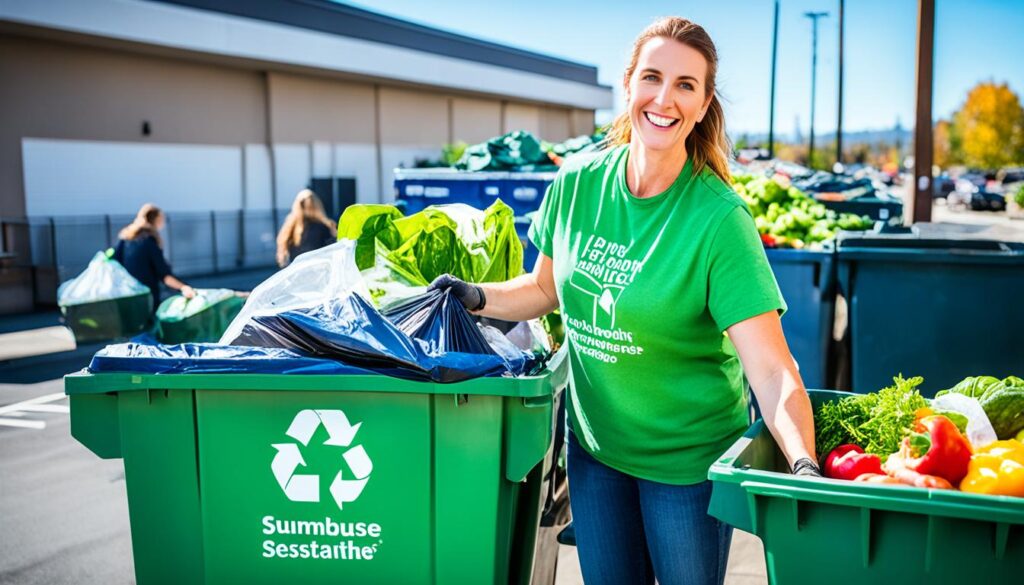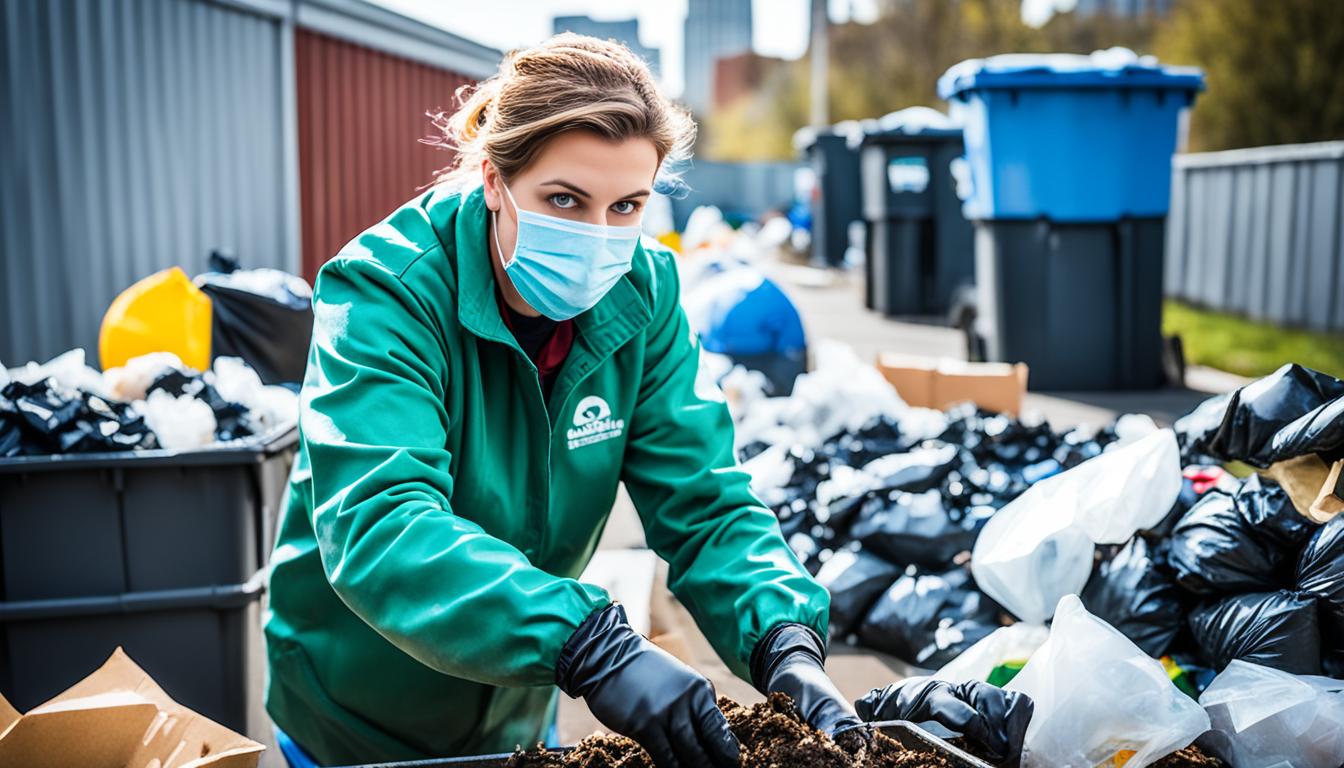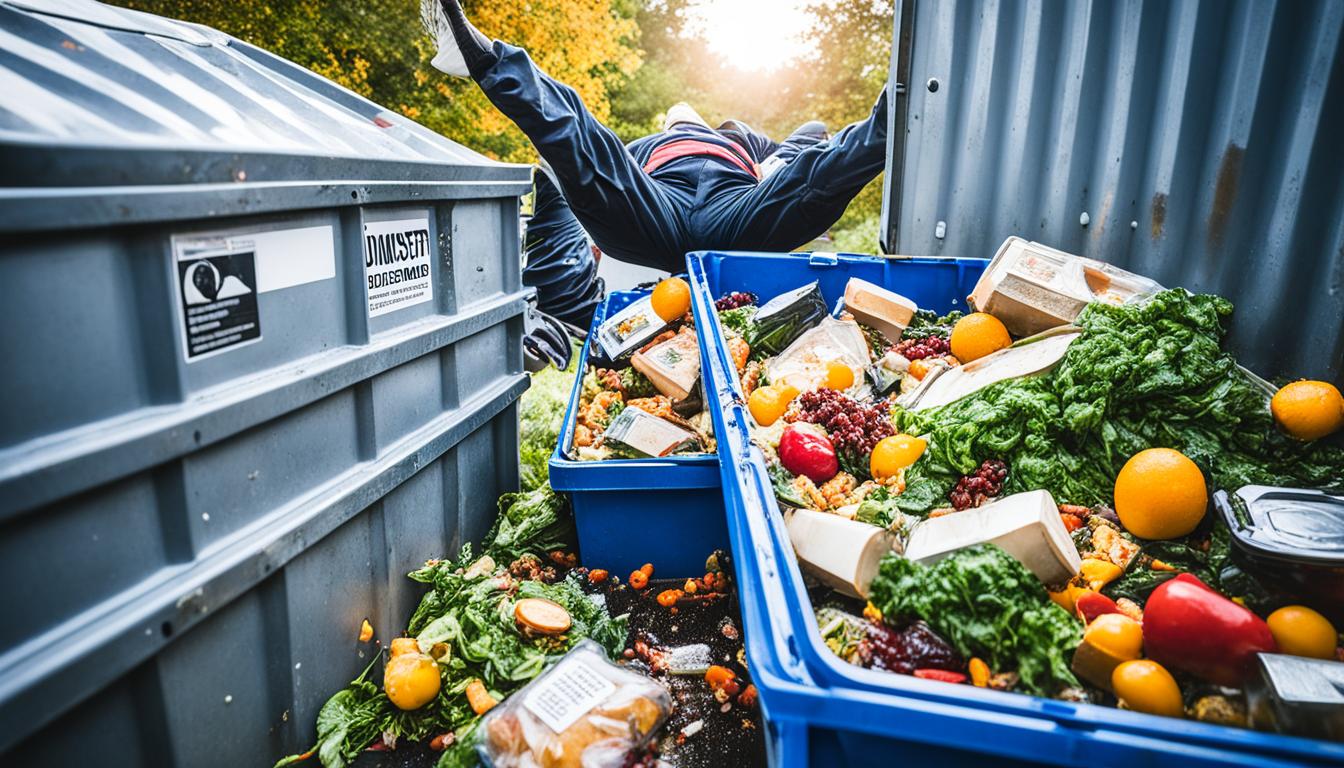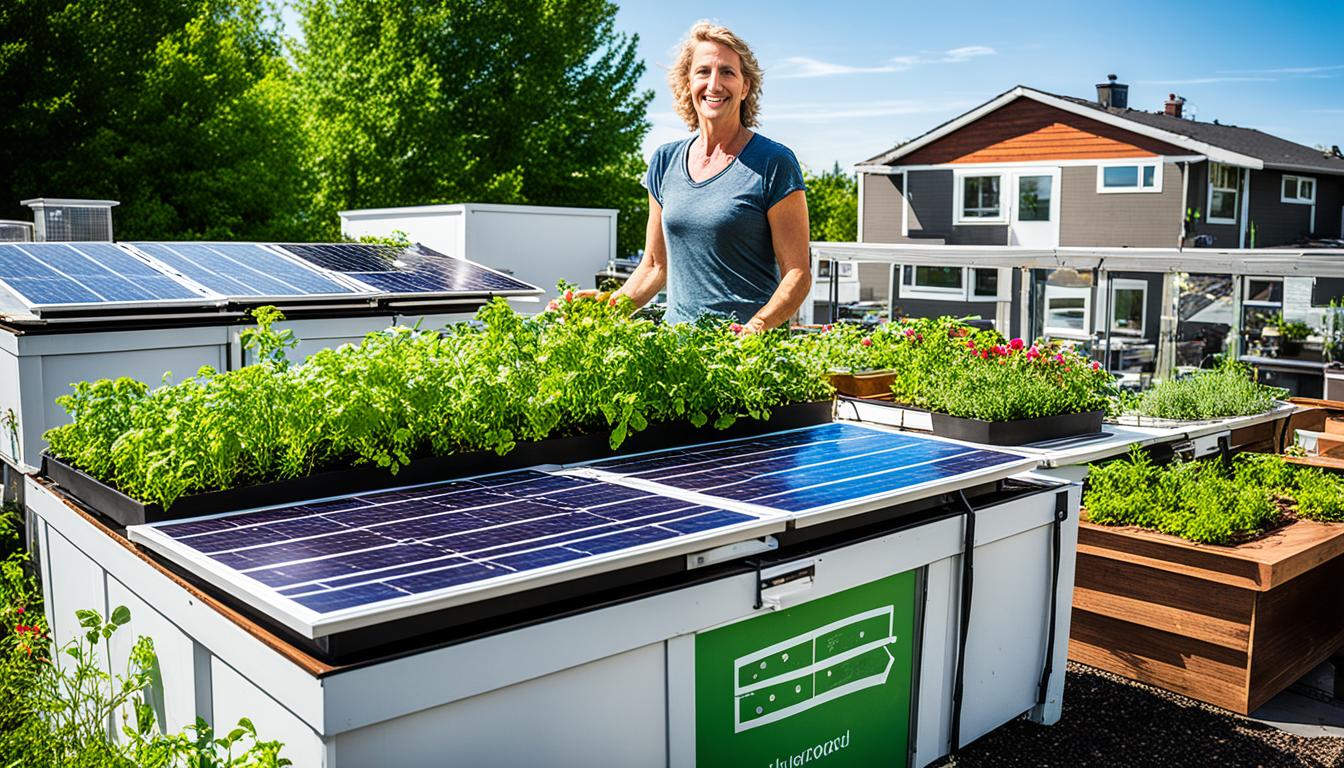Disclosure: This Post Contains Affiliate Links; We earn a commission on purchases.
When it comes to waste management and recycling solutions, one innovative approach that is gaining popularity is dumpster diving. This practice involves salvaging usable items, particularly food, from commercial or residential waste bins. By rescuing materials that still have value, dumpster diving serves as a sustainable solution to waste reduction and contributes to environmentally friendly waste disposal.
Dumpster diving not only helps to reduce the burden on landfills but also promotes a more sustainable cycle of consumption. It has become a form of activism and community building, providing an immediate way to mitigate waste and making use of items that would otherwise contribute to environmental degradation.
Key Takeaways:
- Dumpster diving is a practice of salvaging usable items, particularly food, from waste bins.
- It contributes to waste reduction and promotes environmentally friendly waste disposal.
- Dumpster diving can address issues of poverty and hunger by redistributing salvaged food.
- Legal considerations, such as trespassing laws, should be kept in mind when dumpster diving.
- Supermarkets play a crucial role in reducing food waste and implementing waste reduction initiatives.
Why Dumpster Diving is Good for the Environment
Dumpster diving offers numerous benefits for the environment through effective waste reduction strategies and sustainable waste management practices. By rescuing usable items from dumpsters, this practice contributes to waste reduction initiatives and helps combat land pollution.
Diverting items from landfills is a key aspect of sustainable waste management. Dumpster diving directly supports this goal by salvaging items that still have value, ultimately reducing the amount of waste that ends up in landfills. This practice aligns with the principles of the circular economy, promoting the reuse and repurposing of discarded goods.
Additionally, dumpster diving plays a crucial role in addressing issues of poverty and hunger. By salvaging discarded food, these food waste reduction initiatives can help redistribute resources to those in need. Redistributing surplus food not only reduces food waste but also provides assistance to individuals and communities facing food insecurity.
“Dumpster diving contributes to waste reduction initiatives and promotes sustainable waste management practices.”
Furthermore, dumpster diving raises awareness about consumerism and consumption habits. It serves as a powerful reminder of the significant amount of waste generated in our society and encourages individuals to reconsider their own consumption patterns. By actively participating in dumpster diving, individuals can contribute to a more sustainable and environmentally conscious lifestyle.
The Impact of Dumpster Diving
The impact of dumpster diving can be seen in the tangible reduction of waste and the promotion of sustainable waste management practices. Through this practice, reusable items are given a second life, minimizing the need for new production and reducing the environmental impact associated with resource extraction and manufacturing processes.
Moreover, communities that embrace dumpster diving often foster a sense of camaraderie and mutual support. Sharing resources obtained through dumpster diving not only helps reduce waste but also strengthens social connections and builds resilience within communities.
| Benefits of Dumpster Diving | |
|---|---|
| Reduces waste products | |
| Lowers land pollution | |
| Supports sustainable waste management practices | |
| Addresses issues of poverty and hunger | |
| Raises awareness about consumerism and consumption habits |
Dumpster diving can be a powerful catalyst for change, encouraging individuals, communities, and even businesses to adopt more sustainable practices and waste reduction strategies.
Through dumpster diving, individuals and communities can actively participate in the circular economy, reducing waste, conserving resources, and creating a more sustainable future.
Dumpster Diving: How It Works and the Legal Considerations
Dumpster diving is a waste reduction technique that involves sifting through dumpsters, garbage bins, and trash bags to salvage items that are still in good condition and usable. By rescuing these items, dumpster divers contribute to waste reduction efforts and promote sustainable consumption practices.
While the practice of dumpster diving itself is generally permitted, it is important to be aware of the legal considerations surrounding it. Trespassing laws and property rights vary depending on local regulations, so it is crucial to research and understand the laws in your area before engaging in dumpster diving.
When dumpster diving, exercise caution and discretion to avoid violating any laws or infringing on others’ property rights. It is essential to respect private property boundaries and refrain from creating any disturbances or leaving a mess behind. By being mindful of legal considerations, dumpster divers can continue their waste reduction efforts responsibly and avoid unnecessary conflicts.
The Role of Supermarkets in Reducing Food Waste
Supermarkets play a crucial role in reducing food waste. Many large supermarket chains have implemented initiatives to reduce the amount of surplus food they generate and redirect it to those in need. By partnering with charities and utilizing food sharing apps, supermarkets can ensure that surplus food is distributed to the people who need it most. These efforts contribute to waste reduction and align with sustainable waste management practices.
“We believe in taking responsibility for our impact on the environment and the community. That’s why we have implemented various programs to minimize food waste and support local organizations in their fight against hunger.” – John Davis, CEO of GreenGrocer Supermarkets
Supermarkets have recognized the importance of environmentally friendly waste disposal and waste reduction programs. They have taken proactive steps to address the issue of food waste, both within their operations and through partnerships with external organizations.
- Surplus Redistribution: Many supermarkets have established collaborations with local food banks and charities to ensure that surplus food is delivered to individuals and families in need. Through these partnerships, perfectly good food that would otherwise go to waste is distributed to those who can benefit from it.
- Food Sharing Apps: The rise of technology has brought about innovative solutions to food waste. Supermarkets have embraced food sharing apps that connect them with local community organizations, enabling them to seamlessly donate excess food and minimize waste.
- Sustainable Food Practices: Supermarkets have implemented sustainable practices within their operations to reduce food waste. This includes better inventory management, purchasing practices, and educating customers on proper food storage and preparation to minimize food spoilage.
In addition to reducing food waste and supporting local communities, supermarkets’ waste reduction programs also have a positive environmental impact. By diverting food from landfills, supermarkets contribute to the reduction of greenhouse gas emissions and the preservation of natural resources.
Supermarket Waste Reduction Initiatives
| Supermarket Chain | Waste Reduction Initiatives |
|---|---|
| GreenGrocer Supermarkets | Collaboration with local food banks to donate surplus food |
| FreshNHealthy | Implementation of technology-driven inventory management systems |
| GoodEats Grocery | Partnership with food sharing apps to facilitate food donations |
| EcoMarket | Education programs for customers on reducing food waste |
The collaboration between supermarkets, charities, and technology-driven solutions demonstrates the commitment of the retail industry to sustainable waste management practices. By prioritizing environmentally friendly waste disposal and waste reduction programs, supermarkets are leading the way towards a more responsible and greener future.

The Changing Landscape of Dumpster Diving and Food Waste
The practice of dumpster diving has undergone significant transformations in recent years, reflecting the evolving efforts of supermarkets to address food waste and work towards waste reduction goals. As a result, the availability of discarded items has decreased, making dumpster diving less common.
One notable change in the landscape of dumpster diving is the proactive approach taken by supermarkets in tackling food waste. These establishments have implemented various strategies and initiatives to reduce waste, such as partnering with food sharing apps and charities to redirect surplus food to those in need. This concerted effort by supermarkets contributes to waste management and promotes sustainable waste management solutions.
In addition to minimizing waste, supermarkets have also taken steps to promote sustainable consumption. Instead of discarding misshapen produce, which would have otherwise gone to waste, certain supermarkets now sell such items under specific brand names. This shift encourages consumers to embrace imperfect produce and avoid wasteful practices, aligning with sustainable waste management solutions.
| Traditional Approach | Changing Landscape | |
|---|---|---|
| Availability of Discarded Items | Abundance of discarded items | Decreased availability due to proactive efforts of supermarkets |
| Supermarket Practices | Limited initiatives to address food waste | Implementation of strategies to reduce waste and partner with food sharing apps and charities |
| Promotion of Sustainable Consumption | No focus on imperfect produce | Selling misshapen produce under specific brand names |
The Impact on Dumpster Diving
With supermarkets becoming more diligent in redistributing surplus food, the availability of discarded items for dumpster diving has significantly decreased. While some individuals and communities still practice dumpster diving, its prevalence has diminished due to the proactive approach of supermarkets towards waste reduction. The changing landscape demonstrates a shift towards responsible waste disposal and emphasizes the importance of waste management and recycling solutions in promoting sustainability.

Despite the decreasing popularity of dumpster diving, it remains instrumental in highlighting the need for waste reduction and sustainable waste management practices. The practice’s evolution signifies the progress made towards more environmentally friendly waste disposal methods and bodes well for a more sustainable future.
Conclusion
Dumpster diving, once a popular practice for waste reduction strategies, has seen a decline in recent years due to the efforts of supermarkets and increased awareness of food waste. While it may be less prevalent today, it continues to serve as a reminder of the importance of waste management and the need for sustainable solutions.
The changing landscape of dumpster diving reflects a shift towards more responsible and environmentally friendly waste disposal methods. Supermarkets have taken proactive steps to reduce food waste by partnering with charities and utilizing food sharing apps to ensure surplus items reach those in need. This not only minimizes waste but also aligns with sustainable waste management practices.
As supermarkets prioritize waste reduction, the availability of discarded items for dumpster diving has decreased. This shift highlights the effectiveness of waste reduction programs and the impact of recycling solutions within the food industry. However, it is essential to remember that waste remains a significant issue, and ongoing efforts are crucial to address it.
While dumpster diving may no longer be as prevalent as before, it serves as a valuable reminder of the need for ongoing waste reduction strategies and sustainable waste management practices. By continuing to prioritize these efforts, individuals and businesses can contribute to creating a more sustainable and environmentally conscious future.
Source Links
- https://www.simplyplasticfree.com.au/how-to-dumpster-dive/
- https://blog.arcannwaste.com/why-dumpster-diving-is-good/
- https://theethicalist.com/death-dumpster-diving-reducing-food-waste/

Subscribe to Our Newsletter










